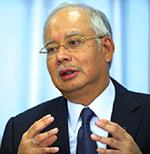Never in my wildest dreams
Published on: Friday, September 04, 2015

Kuala Lumpur: Prime Minister Datuk Seri Najib Razak today lamented the incessant attacks against him by his predecessor and chief critic Tun Dr Mahathir Mohamad, saying that he never expected such conduct in his "wildest dreams".In response to a quip by British journalist Riz Khan, who was the master of ceremonies at the World Capital Markets Symposium in Kuala Lumpur Thursday, Najib said:"I want to paraphrase that in my own context... never in my wildest dreams would I have thought that one of my predecessor will be against me in this manner.
ADVERTISEMENT
"But he's no longer prime minister, he shouldn't take centrestage."Najib's remarks, made before he read his opening speech at the event, was greeted with laughter by local and international participants from the finance, economics, business and geopolitical sectors. Khan had earlier joked in his opening remarks to the crowd, ending with the quip: "I was never in my wife's wildest dreams".Dr Mahathir is one of Najib's staunchest detractors, openly calling for the prime minister to step down over dissatisfaction with Najib's brainchild, state investment vehicle 1Malaysia Development Berhad (1MDB) which had amassed a RM42 billion debt in just six years of operations.Malaysia's longest serving prime minister also faced scathing attacks over another scandal which involved a RM2.6 billion "donation" into his personal accounts ahead of the 2013 general election, allegedly by an unknown Middle Eastern donor. Despite the external pressures, Najib had consistently maintained he would not quit and would continue to steer the country towards achieving developed nation status.
ADVERTISEMENT
Najib said Malaysia's economy now is far stronger and resilient and able to weather any headwinds than during the 1997/98 financial crisis, thanks to various reforms undertaken by the Government. "In the last 15 years, we undertook important structural reforms in the financial and banking system," he said.
ADVERTISEMENT
The reforms include introduction of internationally benchmarked regulatory frameworks and rigorous supervisory regimes, strengthened prudential requirement for market participants and extensive corporate governance reforms. Among the results of all the reforms include local currency bond market emerging as the third largest in Asia, valued at RM1.1 trillion, he said.The bond market helped reduce the country's reliance on short-term foreign currency dominated borrowings as was the case during the 1997-98 crisis. Apart from this, the equity market has also grown to RM1.5 trillion this year compared with RM175 billion in 1998, with much stronger corporate balance sheets and better-governed listed companies, he said. "The institutionalisation of the buy side, anchored by Malaysia's deep domestic institutional investor base, also serves as a source of long-term funds for the capital market," Najib, who is also Finance Minister, said. At the same time, he said the intermediaries have been able to meet significantly higher prudential, compliance and risk management standards with the stockbroking industry operating at a gearing level of 0.1 times currently compared with as high as 1.3 times in 1998. "These structural reforms have collectively strengthened the ability of the Malaysian financial system to weather intense bouts of volatility and to effect adjustment in an orderly manner. "During the recent global financial crisis, for example, our capital market and banking system continued to function unimpaired, with no disruptions or failures recorded," he said. Najib said this resilient has enabled the country's financial system to fulfil its most important function as a critical enabler for economic development. He said by serving as a source of long-term financing to complement the banking sector, the Malaysian capital market had provided RM376 billion through initial public offerings and bond issuances since 2012. "This has resulted in capital formation and job creation in sectors as wide-ranging as infrastructure, telecommunications and agriculture, with gross fixed capital formation ranging between 26-27 per cent of gross domestic product over the same period," he added. Nevertheless, the Prime Minister stressed on the need for policymakers to stay on course in pursuing greater liberalisation and openness to the international community. "We would do well to remember that the long-term gains from Malaysia's integration into the global economy vastly outweigh the short-term dislocations," he said. Najib also expressed confidence in the newly formed Special Economic Committee's capability in formulating immediate and medium-term plans of action to further strengthen Malaysia's economic position. "I am confident the collective wisdom and experienced of the committee to ensure our economy remain on course," he said. He said with all the efforts taken so far, Malaysia is well on track to be a developed nation by 2020. On the Asean Economic Community, the Prime Minister said the regional integration efforts were on course with the private sector increasingly playing a more active role in unlocking the tremendous promise that the region offered. Stay up-to-date by following Daily Express’s Telegram channel.
Daily Express Malaysia




